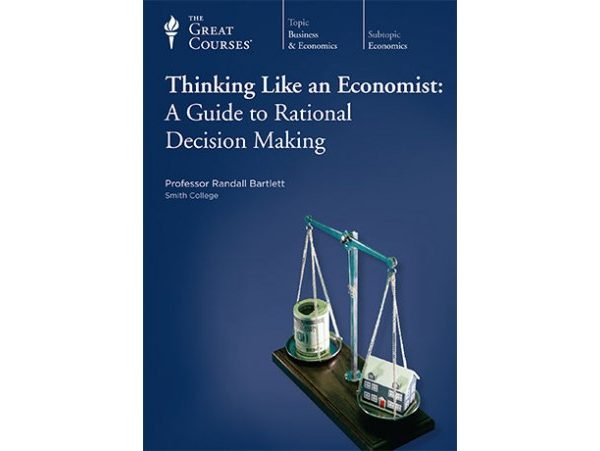AAC | 192 kbps | 48.0 KHz | 2 channels | 06:10:57 | 5.6 GB
Money management can be intimidating, but the good news is that the newest research into the human brain can help us understand why we make mistakes and how we can create an effective plan to meet our financial goals. Learning to navigate complex financial markets and create good financial habits is essential to the all-important goal of gaining control over our financial future.
Money management requires knowledge of financial products, investment and risk theory, and essential tax rules. But it also requires an understanding of how we as fallible humans make mistakes. These lectures will go beyond the advice of a traditional money management course and delve into the emerging science of financial decision-making. With this course, you’ll learn how to overcome your brain’s programming and avoid following your emotions down the wrong financial path.
The goal of money management is to maximize our happiness at every stage of our lives. Whether you are a novice investor or a seasoned pro, a young person getting started in life or a Baby Boomer contemplating retirement, Money Management Skills is an excellent primer for creating financial security. Taught by financial expert and Texas Tech University professor Michael Finke, these 12 practical lectures will boost your confidence around money management. This is not a course for big investors looking for the next hot stock. Rather, these lectures are for regular people who want to make sound financial decisions without obsessing over the daily changes in the market.
For most of us, a few basic principles of money management can help us get our financial houses in order, answering such questions as:
What are the optimal uses of credit and debt?
Is home ownership actually a good investment?
How much insurance do I really need?
Where should I invest my money?
What should I do to prepare for retirement?
Money Management Skills takes you on a tour of some of the most widely available financial products, from mutual funds to life insurance to college savings accounts. Professor Finke offers evidence-based guidance for building a financial strategy using these products. When you complete the course, you will have all the important information you need to manage your finances—as well as being aware of psychological pitfalls to avoid.
Manage Money for Every Stage of Your Life
After reviewing the psychology of decision-making—and how our instincts often steer us wrong when it comes to loss aversion, risk tolerance, and information overload—Professor Finke explains the “life cycle theory” of financial planning. This eye-opening theory offers a framework for making financial decisions based on the different stages of your life, and it will give you an entirely new perspective on money management.
The goal is simple: to get the most out of your money across time. There is a time in all of our lives where we should be borrowing more and saving less, and a time when we should be saving more and borrowing less. As he teases out the implications of this framework, Professor Finke introduces you to the range of financial products and tools at your disposal, including:
liquid assets,
stocks and bonds,
mutual funds,
credit,
mortgages,
insurance, and
estate planning.
You’ll receive a comprehensive overview of these options, as well as general guidance about the principles of taxation, building a credit history, analyzing your tolerance for risk, choosing a retirement age, and much more. Professor Finke ties it all together with the most up-to-date financial data and trends.
Create Your Long-Term Financial Plan
The tricky thing about financial management is that our instincts are often unreliable. Scientific evidence suggests that humans are hard-wired to make emotional decisions that prevent us from making good decisions under stress. For instance, we might be tempted to sell stock when the market falls, or we might overestimate certain risks while ignoring greater threats. The key to sound money management is to develop patience and discipline for the long haul.
Money Management Skills gives you a rational blueprint for setting financial goals, managing debt responsibly, setting aside money for retirement, taking advantage of tax benefits, navigating end-of-life issues, and much more. You’ll discover a host of basic rules of thumb, such as:
Education is one of the most valuable investments you can make for yourself or your children.
Choose passive, low-expense mutual or index funds for long-term investing, and be sure to diversify your portfolio.
Term life insurance is a great value, but depending on your tolerance for risk, comprehensive auto insurance might not be such a good deal.
Retiring just a few years later can leave you with significantly more money to spend annually during your retirement.
While everyone’s life is different, the information and sound advice in this course will empower you to create your own financial plan to reach your goals. Professor Finke provides a worry-free approach to handling all aspects of money management.
Lectures:
1 Understanding Your Financial Brain
2 Managing Money with Life Cycle Theory
3 Basic Investing: Keep It Simple
4 The Key Financial Instruments
5 How to Use Credit Optimally
6 Investing in Education
7 The Economics of Home Ownership
8 Managing Risk with Insurance
9 Essential Tax Principles
10 Saving for Retirement
11 Fundamentals of Estate Planning
12 Putting Your Financial Plan Together











Reviews
There are no reviews yet.